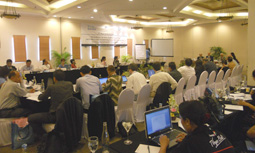Being Heard: The Role of Ethical Journalism and Media Support in Enhancing Democratic Participation in a Changing Information Environment In conjunction with the Bali Democracy Forum “Enhancing Democratic Participation in a Changing World: Responding to Democratic Voices".
FINAL STATEMENT
The participants of the 3RD Bali Media Forum workshop “Being Heard: The Role of Ethical Journalism and Media Support in Enhancing Democratic Participation in a Changing Information Environment” organised by the Global Forum for Media Development, the Indonesian Press Council and the Institute for Peace and Democracy, meeting on December 8-9 2011 in Bali, agree the following conclusions and statement to be noted by the Bali Democracy Forum IV:
We the representatives of journalists’ groups, press councils and media support bodies from 17 countries of the Asia-Pacific region reiterate our support for the declarations of the 1st and 2nd Bali Media Forums, notably:
That building democracy and creating the conditions for social and economic development requires the rule of law, a community of citizens that is fully informed, and systems of governance that enjoy public trust,
That creating an environment to ensure free media and independent journalism, without any form of legal or political pressure, must be a priority for all governments committed to democracy,
That government should support the creation of transparent, professional and independent forms of media accountability to:
- advocate and campaign for press freedom and good governance in media,
- contribute to education within society on the role of free media in democracy,
- mediate problems that arise between media and their audience,
- promote access to public information and to information technology that will ensure the full participation of citizens in democratic society.
Even though different codes of ethics, different media laws and different cultural traditions exist throughout the region, journalists were guided by generally accepted principles summed up as:
- Tell the truth;
- Be independent;
- Minimise harm.
Independent media accountability systems strive to promote high standards of journalism guided by core values of journalism:
- Ask questions, challenge the conventional wisdom;
- Check out the whole story and strive for balance;
- Provide context to readers, viewers and listeners.
These principles apply to journalism on whatever platform it is distributed. On-line journalism is covered by the same standards as traditional media.
Social media has emerged as a tool to promote democratic debate. It provides a unique platform for accessing and sharing news and opinions, challenging the traditional hierarchy of information and giving voice to otherwise often marginalised communities. There are several important initiatives going on in the region that use mobile technology to expose corruption and to involve poor and marginalised communities in democratic debate.
At the same time social media, blogs and new information players pose a challenge to maintaining high standards of journalism and public information. Most of the time blogs are expressions of individuals’ opinions, not journalism. Web sites and mobile phone news services provided by “traditional” media in most cases remain the most trusted and popular sources of information.
The independent self-regulatory rules governing media should extend to media organisations’ own use of social media. These profiles are clear extensions of the editorial material published through other channels, and therefore fall under the editorial responsibility.
Personal blogs by journalists not linked to their media organisations are individual’s expression of opinion but ethical in-house rules should be discussed to ensure that ethical standards also guide personal blogs and expressions by journalists.
Journalism is more than a business and has a key role to play in development of democratic society, providing exigent information and challenging the public.
More education and media literacy initiatives are needed to allow media users to make sense of the information they receive via all the different platforms and to be able to make educated judgements about the validity of the information they receive. Independent press and media councils have a role to play in promoting high standards of journalism in all forms of media and they should organise campaigns of media literacy with the public.
Legislation providing for the right to informaiton is especially needed in several countries of the region.
The participants support initiatives to promote high quality journalism, including the Coalition for Ethical Journalism of the Global Editors Network, the IFJ’s Ethical Journalism Initiative and the global initiative of the GFMD bringing together media support groups, editors, journalists and self-regulatory structures to promote journalists’ ethics in media development at the GFMD’s 3rd World Conference in Brasilia in September 2012.
The participants support the continued work of the network of independent press councils in the region and propose that this network should be used to engage in discussion with ASEAN on issues of importance to media.
The GFMD will publish the interventions made by participants and speakers on its web-site at http://gfmd.info/index.php/regions/category/asia/bali_media_forum_2011/.
The Bali Media Forum should continue to be a regular annual event around the Bali Democracy Forum in order to keep on highlighting the key role of free, independent, pluralistic media play in building and strengthening democratic society and to promote independent and trustworthy media accountability structures in the region.
(Organised with financial support from the Norwegian Foreign Ministry)

